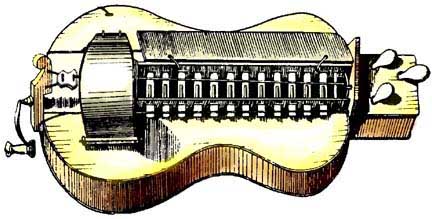- Lira (instrument)
Infobox Instrument
name=Lira
names=HS#:312.322-72
classification=
*Aerophone
range= Varies according to voice of player
related=
*Hurdy-gurdy
*Relia The lira, or relia, ( _uk. ліра) is a variant of the
hurdy-gurdy , an instrument which can trace its history back to the 10th century. It is thought that the lira was introduced into Ukraine in the 17th century byCossacks who had fought in France as mercenary soldiers. It was used as an instrument to accompany religious psalms, kants and epic ballads (known asdumy ) performed by itinerant blind musicians calledlirnyky (sing. lirnyk). Occasionally lirnyky were hired to play dance music at weddings. They often organized themselves into guilds or brotherhoods with their own laws and secret language known asLebiy .The traditional lira has three strings, one on which the melody is played with the aid of a special keyboard, the other two producing a drone of a fifth. The sound is produced by a wooden wheel which is rotated by a crank held in the right hand. This wheel rubs against the strings, setting them into vibration like a bow on a violin.A number of different types of chromatic liras have been produced in Ukraine,. In recent times interest in the instrument has increased considerably.
For more information on the lira visit the Hurdy Gurdy Home Page.
ources
* Mizynec, Victor - Folk Instruments of Ukraine - (Bayda books, Australia 1987)
*Cherkasky, L. - Ukrainski narodni muzychni instrumenty // Tekhnika, Kyiv, Ukraine, 2003 - 262 pages. ISBN 966-575-111-5ee also
*
Lirnyk
*Bandurist
*Kobzar
Wikimedia Foundation. 2010.
